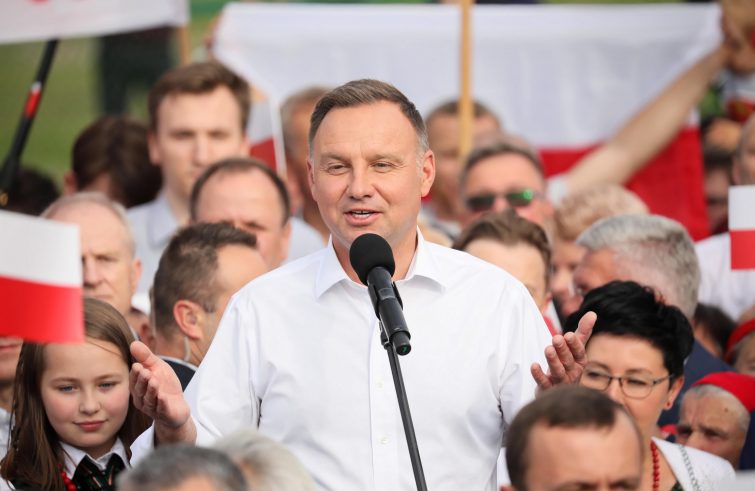
Poland’s presidential runoff election, held on Sunday, July 12, saw 48-year-old Andrzej Duda, supported by the centre-right coalition of Jarosław Kaczyński, head of the ruling party Law and Justice (Pis), win with 51.03% of the vote. His opponent, liberal-conservative candidate Rafał Trzaskowski, mayor of Warsaw, trailed with 48.97%. The Polish presidential elections, initially scheduled for May 10, were postponed on account of the coronavirus pandemic. The first round, with as many as eleven candidates running, took place on 28 June. SIR interviewed Bogusław Chrabota, editor-in-chief of national daily newspaper Rzeczpospolita, who shared his thoughts about an electorally-divided Poland.
Jarosław Kaczyński, president of the Pis, said that in the election campaign Duda had everyone against him, and that he was the victim of political “aggression” by internationally-influenced media; yet he won considerable personal success. However, the OSCE assessment is that the election campaign was marked by homophobia, xenophobia and anti-Semitism, coupled with a biased narrative by public media, while Duda allegedly received undue support from members of the Pis government. Which description of the election campaign sounds truer to you?
It seems quite evident that the election campaign was not conducted on fair ground. The entire State apparatus, along with all right-wing parties, sided together against opposition candidate Trzaskowski. The cabinet did not convene for a whole month since all its members were engaged in the election campaign in support of outgoing President Duda. Even the simultaneous fight against the pandemic was instrumentally used in the election campaign, while public media outlets proved to be totally subjugated to government power. The opposition candidate did not receive such support.
This testifies to the importance of Duda’s electoral success for Kaczyński.
In fact, according to the Pis leader, only a presidential victory will makes it possible to conclude his conservative revolution which he named “the Good Change.” The election campaign was not that biased, as is often said: but voters were influenced by the bogeyman of LGBT ideology, by a possible return of Left forces into national government (thus evoking the revival of communism – Ed.’s note), by the introduction of euthanasia, or by an alleged German influence that supposedly looms over national politics. Trzaskowski was presented as the candidate that would cut 13th monthly retirement pay and downsize welfare. These arguments were added to other negative stereotypes about Trzaskowski, presented as a “thief” or “leftist”.
International press speculates that Poland will become an authoritarian state, but it also notes that one in two Poles disapproves of anti-German and anti-European authoritarianism. Do you agree with these evaluations?
The political parties that form part of the incumbent government have authoritarian but not totalitarian tendencies. We should not exaggerate! In Poland we have free press, independent courts and local authorities that are independent from the central government. It may well be that Kaczynski intends to wipe out these oases of freedom, but it will not be easy, and perhaps not even possible. For half of the Polish people would reject it.
Libertarian potential in Poland is too great for anyone to try to diminish it.
In the future, step by step, the central government will try to take over hitherto independent domains in the country. However, it is bound to be defeated. The young, strong, modern and learned Poland will not allow it. Even though many Poles – I think this is of some importance – now consider themselves middle class, and would be willing to sacrifice their freedom to maintain their status. In this respect, Poles are perhaps more opportunist than they were 30 years ago.
Polish entrepreneurs hope that Poland will isolate itself from other EU countries. They fear, among other things, a cut in funding for economic recovery in the aftermath of the pandemic. Following the coronavirus pandemic, will Duda’s Poland draw closer to Brussels?
I think he will. The rapprochement will be driven by interest, but it will be carried out with a certain determination. No one can afford a Polexit. Most right-wing politicians have long repeated that they are in favour of European integration, provided it is an EU of equals.
National elections will take place in three years’ time. Will Trzaskowski succeed in uniting the opposition that already seems more divided than before the runoff? Trzaskowski can no longer count on the over 10 million supporters who voted for him last Sunday. It will be very difficult for him to play the role of the leader because he is not a member of parliament but only the mayor of the capital city.
He would have to become head of the largest opposition party, Civic Platform (Po) in no time, and this seems to be very unlikely.
I think his rising star will slowly die out. There are many others who would like to take the lead of the opposition.








